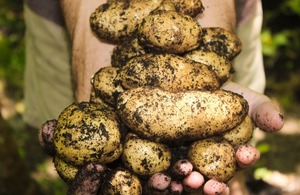£15 million to help charities get spare produce to those in need
Around 330,000 tonnes of edible food is wasted or fed to animals each year before leaving farms

Thousands of tonnes of food, including festive favourites like brussels sprouts and potatoes, that might otherwise go to waste will be delivered to those who need it most, thanks to a new £15 million government fund.
An estimated 330,000 tonnes of edible food is either wasted or repurposed as animal feed before leaving farm gates every year. While farmers would prefer for this to be destined for people’s plates, charities that redistribute food often lack the means to collect food from farms and get it to those who need it.
To strengthen the links between farms and charities and help solve the problem of farm food waste, a new scheme will see grants starting from £20,000 made available to the not-for-profit food redistribution sector in England. Throughout the year but especially over Christmas, the season of goodwill, this will help organisations like homeless shelters, food banks and charities fight hunger.
It will help British farmers to deliver good food for those that need it and reduce the costs they face when dealing with waste, while also increasing the capacity and capability of the redistribution sector to take on farm surplus.
Circular Economy Minister Mary Creagh said:
With families gathering to celebrate Christmas and the New Year, it’s important to remember those in our communities who may be going hungry this festive period.
Nobody wants to see good food go to waste – especially farmers who work hard to put food on family tables across the country.
Our new fund will help the charitable sector to work more closely with farmers, helping to find new opportunities to get their world-leading produce to those most in need within our communities.
In a joint statement, Charlotte Hill, CEO of The Felix Project, and Kris Gibbon-Walsh, CEO of FareShare, said:
After years of campaigning by food redistribution charities, we are thrilled to see this fund come to fruition. We are pleased that the government has recognised that too much food goes to waste on our farms, and that it should be redistributed to feed people who need it.
We look forward to acting quickly with the government, the charity sector, and farmers to maximise the impact of this initiative during British growing season, ensuring surplus food reaches as many people as possible. We have a proven model which funds farmers to redistribute their unsold food, which means that together, we can take meaningful steps toward achieving a zero-waste Britain.
Harriet Lamb, CEO of global environmental NGO WRAP, said:
This is welcome support for farmers and redistribution organisations ensuring more quality food is rescued and can support more people and communities, while reducing the environmental impact of food waste on climate change.
It gives a flying start to the New Year, ensuring that food charities and the farming sector can both make a difference immediately and can develop long term solutions. Every year, the amount of surplus food being redistributed is going up, but sadly the need is also increasing so this gives a much-needed boost. Last year, 191,000 tonnes of food from retailers, food manufacturers, the hospitality sector and UK farms - worth £764 million - was redistributed with the potential to make 450 million meals.
The funding could go towards enabling successful applicants to buy new equipment, such as balers or hoppers, to allow bulky food items to be collected or processed into parcels, and technology to help donors and food redistribution charities work more closely. Money could also help provide more training to staff, to enhance their IT and food safety skills.
Information on when the fund opens and full eligibility criteria for applications will be confirmed in the New Year.
As set out in the Plan for Change, the government is delivering growth and economic stability for communities across the country. We are supporting farmers to help grow the rural economy, while paving the way to a circular economy, where waste is reduced and growth is accelerated.
To help end the throwaway society, the UK Government has formed a Circular Economy Taskforce, comprising of members from industry, academia, and civil society across the UK. They will lead on the development of a Circular Economy Strategy for England, which will be published next year outlining how individual sectors can contribute to ambitions in this area.
This is alongside continued support for the Courtauld Commitment 2030, managed by environmental NGO WRAP, which looks to deliver a more sustainable supply chain and reduce food waste in the home - tackling food waste, reducing greenhouse gas emissions and water usage.